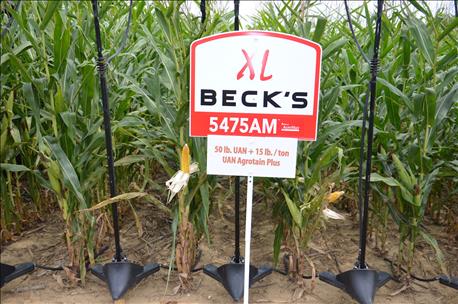
The University of Illinois announced closure of research activities at four outlying research farm sites last fall. More universities appear to be encouraging researchers to seek outside dollars for research and touting their success when they bring in grants.
Purdue University has held to its commitment of providing state Extension specialists who can also do field research. Some of them, like Bob Nielsen, Jim Camberato and Kiersten Wise, are moving heavily toward on-farm research in large trials with farmers. Their areas of interest for these studies so far have been nitrogen rates and timing, population comparisons and fungicide testing, including application timing trials for fungicides.

FILL A NEED: Ryan McAllister says Beck’s feels so strongly about the need for farmer research that they’re making a huge investment in ramping up their Practical Farm Research program.
There are also On-farm testing network programs, often linked to a state’s department of agriculture, operating across the Midwest. Most of those programs also concentrate on major practices, such as nitrogen rates, populations, tillage comparisons and cover crop tests.
Yet some farmers have asked and continue to ask: “Who will test practices and products, including various types of short-line equipment add-ons and biological products?” It’s a question farmers ask because they make these decisions as to whether to buy these products or not on a regular basis. Especially in a year with tight margins, these decisions become critical.
Ryan McAllister, director of Practical Farm Research for Beck’s, says the company made a major commitment to upgrade their PFR program in 2015. They’re implementing it now, adding a large number of staff members around the country committed solely to this research effort.
“My goal is to help determine which products or practices might be profitable for farmers, and which likely aren’t profitable,” he says. “We go beyond testing populations and nitrogen rates, and evaluate other things farmers are asking about.”
Beck’s began their Practical Farm Research Program years ago. But changes being instituted now are taking it to a new level, McAllister says. The company has PFR sites at Atlanta, Ind., Downs, Ill., London, Ohio and Henderson, Kentucky. In addition, they’re starting a new site near Colfax, Iowa. Plots will be planted there for the first time this spring.
In Missouri, they’re taking a different approach, assigning a PFR agronomist to work with farmers throughout the state conducting on-farm trials. And in Tennessee, they’re working with the University of Tennessee to include some trials in university plots.
McAllister heads the program, with two new positions, innovative lead and head of data management, working with him. The company is adding PFR agronomists to support various sites or areas, with sole responsibilities to work with PFR plots and/or cooperators. There is also a PFR manager at each site, and one or more full-time assistants.
“We’re adding the agronomists because we want to not only know if something works, but why it works,” Mc Allister says. “We want them to walk PFR plots and trials, make observations and begin to uncover the answers to the ‘why’ questions.”
Going forward, each trial will be replicated three times, he adds. Once the results are compiled each year, they’re published in a PFR book, and also placed online. “Some results may only go online in the future due to practical reasons,” he says. “But we will always publish the results somewhere, no matter how the test turns out.
“We’re also hearing more demand for multi-year and multi-site results, so we will continue doing a number of trials the same way at each location.”
The company will distribute 55,000 copies of the 2015 PFR book. That’s far more than the number of Beck’s customers.
“We see a real void for answers to practical questions, and we’re committed to being a source that provides information so farmers can make more informed decisions,” McAllister concludes.
About the Author(s)
You May Also Like




